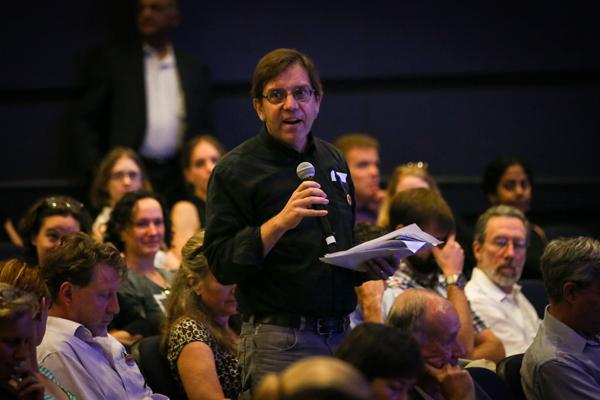The Faculty Senate unanimously approved a group of faculty to consult on the presidential search and voted to augment the group with additional members Friday.
The faculty consultative committee was selected and initially voted on by the Faculty Assembly — a body made up of all GW faculty — Friday morning. Faculty approved members of the consultative group, which is meant to give more input on the search for GW’s next president, after some questioned the composition of the original search committee and the role of the consultative committee.
The Faculty Assembly approved nine faculty members to the consultative committee, which is assembled for each presidential search, and requested to add seven extra members to increase the diversity of faculty input throughout the search process. Both measures were pending until they were approved by the Faculty Senate that afternoon.
“There is a need, an important need, to have better representation, to give a better voice to humanities and the social sciences in the search process,” Charles Garris, the chair of the Faculty Senate’s executive committee, said. “The idea was that perhaps it wouldn’t be a bad idea to give voice to other parts of the University community.”
Faculty members from nine of GW’s 10 schools, excluding the College of Professional Studies, were selected to join the group. Four of them were women — three more than the one female faculty member selected for the official search committee.
Throughout the assembly, faculty criticized the selection of faculty for the main search committee, saying it is not representative of minority or female faculty members and did not include faculty from GW’s humanities departments.
The consultative committee is meant to represent all types of faculty members’ goals in the search process, the chair of the Board of Trustees Nelson Carbonell said during the assembly. But he said members of the committee will not be involved in the interview process or know who candidates are.
“I hope you appreciate from my standpoint and all of our standpoints that we don’t want to lose candidates because they don’t feel like the process is going to protect them and their integrity at the institution they are at,” he said. “We’re not going to do something to jeopardize that.”
Faculty said they thought the consultative committee therefore would not play a big enough role in selecting a president.
Andrew Zimmerman, the president of the Faculty Association, questioned what the faculty consultative committee will consult on, given the limited input and information the group will have about the pool of candidates.
“Given what we’re just learning about how limited the knowledge of the consultative committee will be about the applicants and the candidates, what exactly will the consultative committee consult on?” he asked.
Tyler Anbinder, a history professor, expressed continued concerns that the faculty on the search committee are “so white, so male, so unrepresentative of the overall faculty.”
“People on search committees tend to want to hire people who look like them in all sorts of ways,” he said.
At the Faculty Senate meeting, members approved the resolution to add seven more members to the faculty consultative committee but continued to question the consulting group’s role and the way it is selected.
Garris, the chair of the Faculty Senate’s executive committee, said faculty can nominate candidates for the seven slots through a “Survey Monkey-type” questionnaire. Once the Faculty Senate executive committee decides on a seven-person slate, the Faculty Senate will vote on the slate as a whole. If the slate is not approved, faculty will discuss the issue in October.
Faculty Senate members said they were concerned about a lack of transparency in the selection process for the consulting committee.
Kim Roddis, a professor of civil and environmental engineering, said she was worried that simply approving or not approving an entire slate of seven candidates would take away the democratic process of the election. It would be more fair to vote for individual candidates rather than a slate, she said.
“I do think that it would be worth it, even if it takes a little longer,” Roddis said. “It would be worth delaying a week or two weeks if we could have that process seem a little more democratic.”
Benjamin Hopkins, an associate professor of history and international affairs, said that to increase transparency, he would like to see the specific reasons the executive committee makes decisions about who is on the slate.
“I encourage the executive committee to lay out explicit criteria by which they are recommending those people,” Hopkins said. “It would address those issues of transparency, and there should be some publicly accountable justification of those choices.”







